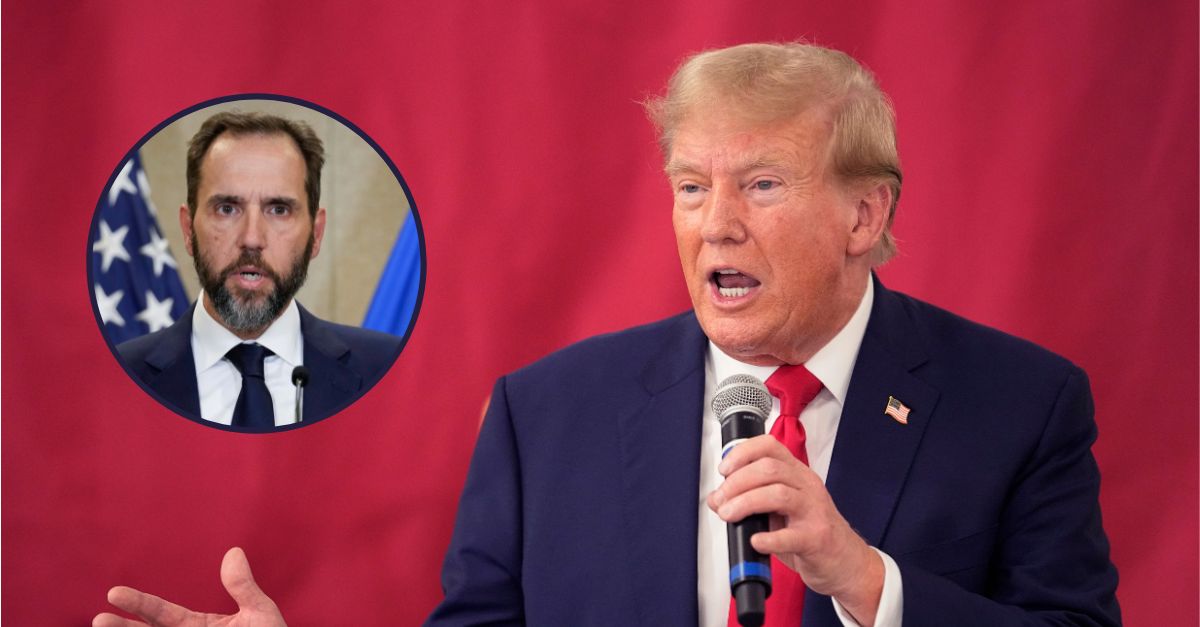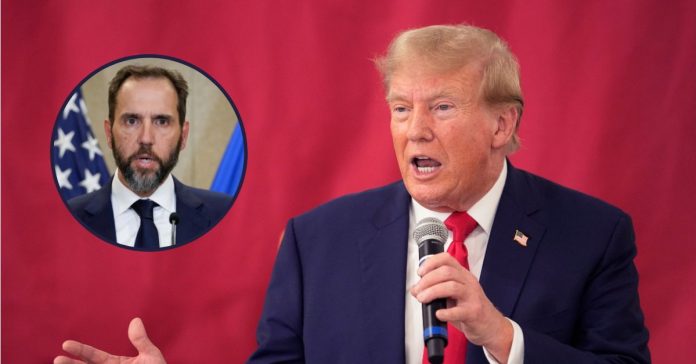
Background: Republican presidential candidate and former President Donald Trump speaks at the South Texas International Airport, Nov. 19, 2023, in Edinburg, Texas. AP Photo/Eric Gay, File. Inset: Special Counsel Jack Smith. AP Photo/J. Scott Applewhite, File.
In a motion to compel discovery that curiously relies both on debunked conspiracy theories of 2020 election fraud as well as credible intelligence that Donald Trump has categorically rejected for years, lawyers representing the former president in his impending election subversion trial now allege special counsel prosecutors have engaged in “sabotage” and “suppression” of potential defense evidence.
The 37-page motion is a thicket of contradictions but chief among them is a request for access to classified records underpinning an intelligence community report that found Russia interfered in the 2016 election.
Trump has long derided these findings as false publicly but now contends he is “entitled” to classified elements in that report that he says would vindicate him of criminal conspiracy charges in Washington, D.C., and demonstrate that his 2020 and 2021 “concerns” about so-called rampant election fraud were “genuine.”
“The special counsel’s office falsely alleges that President Trump ‘eroded public faith in the administration of the election,”” Trump’s lawyer Todd Blanche wrote.
But, Blanche continued:
The 2016 Election ICA uses strikingly similar language to attribute the origins of that erosion to foreign influence — that is, foreign efforts to “undermine public faith in the U.S. democratic process.” The [special counsel’s] Office has argued elsewhere that President Trump “had access to far more information than others in the country,” including “the benefit of the full resources of the federal government.”
The Office may be correct, but it cannot selectively present intelligence information that supports its narrative while suppressing intelligence that underscores President Trump’s good faith.
Thus, President Trump is entitled to the detailed information supporting the conclusions in the 2016 Election ICA, including specific intelligence on key elements of influence campaign, [Exhibit A] in order to demonstrate to the jury that he did not create or cause the environment that the prosecution seeks to blame him for.
Attempting to gird this claim and attached to the motion was a letter from Trump’s lawyers to special counsel from this October.
The letter described Trump’s defense team’s intent to use a sweeping definition of “foreign interference,” a definition that is interestingly even broader than the one Trump defined by executive order in 2018.
In that executive order, Trump made it a requirement for the intelligence community to produce reports on “foreign election interference” including activities that targeted political candidates, campaigns or organizations, the nation’s election infrastructure, the counting of votes and the “timely transmission” of election results.
Now Trump’s lawyers say they must go even further when it comes to his trial and in their request: they argue that they must be able to locate evidence of “any overt or covert effort by foreign governments” as well as ” non-state actors … agents and associates of foreign governments and non-state actors” who meant to “affect directly or indirectly a U.S. person or policy or process of any federal, state, or local government actor or agency in the United States.”
Adding to this, and despite a history of bald criticism that the House Select Committee to Investigate the Jan. 6 Attack on the U.S. Capitol is wholly bogus on its face, Trump’s lawyers contend the very same committee could also help vindicate him by turning over records tied to findings that actors from Russia and China “attempted to influence” the 2020 election.
He has also asked prosecutors to provide any exculpatory records it has affirming the Cybersecurity and Infrastructure Security Agency finding from Nov. 12, 2020 that “the November 3rd election was the most secure in American history.”
Notably, the director of that agency at the time, Chris Krebs, was fired by Trump just a few days after that statement was made.
Roughly a month later, Krebs would testify in an open session to Congress beseeching lawmakers and the former president to accept that “in no case did the Russians access any voting machines, tabulators, or equipment related to vote casting, counting or certification” in the 2020 election.
In his Washington, D.C., indictment, Trump faces four charges: conspiracy to defraud the United States, conspiracy to obstruct an official proceeding, obstruction of an official proceeding, and conspiracy to “injure, oppress or intimidate” people from exercising their constitutional rights.
Yet the motion to compel discovery is mostly devoid of requests for evidence pertinent to those charges. It doesn’t zero in on these allegations as much as it seeks to twist the prosecution’s indictment.
The motion comes just 24 hours after presiding U.S. District Judge Tanya Chutkan denied a request for pretrial subpoenas that Trump sought tied to so-called “missing materials” from the Jan. 6 committee.
Chutkan said Trump provided no evidence to support his claim that materials were “missing” and for some items he claimed he did not have access to, like select Jan. 6 committee transcripts, she found that in fact he did.
Chutkan will have the final say in what discovery is considered admissible.
Trump’s lawyers also indicated in their filings Monday that they intend to seek records about security measures in place at the Capitol for Jan. 6 and they also are making a long shot bid to have materials from former Vice President Mike Pence provided in discovery.
Taking a shot at Pence, Trump’s lawyers claim, without evidence, that Pence will be a witness at trial who has “an incentive to curry favor with authorities.” This, they argue, is because he could have been charged in Trump’s classified documents indictment in Florida.
A response from prosecutors is expected in the week ahead.
Have a tip we should know? [email protected]

